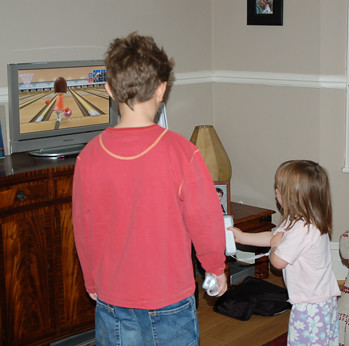 I often wonder if previous experience in playing an #exergame impacts the overall experience and success of game play. Levac et al. also wanted to know whether motivation to succeed at the game impacted movement characteristics (quality and quantity) in children. Using force plate data while playing Wii Sports and Wii Fit #exergames, participants who had previous experience playing Wii Fit moved more than those without experience. As they also concluded, if exergames are to be used as a modality in rehab settings or as an educational tool, its important to sequence positive learning experiences to improve game performance as well as self-efficacy.
I often wonder if previous experience in playing an #exergame impacts the overall experience and success of game play. Levac et al. also wanted to know whether motivation to succeed at the game impacted movement characteristics (quality and quantity) in children. Using force plate data while playing Wii Sports and Wii Fit #exergames, participants who had previous experience playing Wii Fit moved more than those without experience. As they also concluded, if exergames are to be used as a modality in rehab settings or as an educational tool, its important to sequence positive learning experiences to improve game performance as well as self-efficacy.Levac D, Pierrynowski MR, Canestraro M, Gurr L, Leonard L, & Neeley C (2010). Exploring children's movement characteristics during virtual reality video game play. [Exergame] Human movement science PMID: 20724014
Lots more news and footage will be coming out next week from the Games for Health Conference in Boston.
Additional Games for Health Keynotes!
Constance Steinkuehler Squire, senior policy analyst for the White House Office of Science and Technology Policy, will discuss the opportunities for videogames to address national challenges, including those in health, health care, and biotechnology.
Bill Crounse, MD, senior director of worldwide health for Microsoft, will present “Connecting & Kinecting Health and Health Care,” which will explore how Microsoft and its partners are merging its information and game technologies to create global solutions for personal health and professional health care.
Jane McGonigal, New York Times bestselling author and co-founder of SuperBetter Labs, will highlight the design and release of SuperBetter, a game-based social application designed to help people boost personal resilience and lead healthier, longer, and more positive lives.
About Games for Health
Founded in 2004, the Games for Health Project supports the development of the health games community, champions efforts to mainstream health games, and brings together researchers, medical professionals, and game developers to share information about the impact games and game technologies can have on health, health care, and policy. The Pioneer Portfolio of the Robert Wood Johnson Foundation is a major supporter of both the Games for Health Project and its annual Games for Health Conference.
About the Robert Wood Johnson Foundation and its Pioneer Portfolio
The Robert Wood Johnson Foundation focuses on the pressing health and health care issues facing the United States. As the nation’s largest philanthropy devoted exclusively to improving the health and health care of all Americans, the Foundation works with a diverse group of organizations and individuals to identify solutions and achieve comprehensive, meaningful and timely change. Projects in the Pioneer Portfolio are future-oriented and look beyond conventional thinking to explore solutions at the cutting edge of health and healthcare. For more information, visit www.rwjf.org/pioneer.
Abstract
There is increasing interest in the use of commercially-available virtual reality video gaming systems within pediatric rehabilitation, yet little is known about the movement characteristics of game play. This study describes quantity and quality of movement during Nintendo Wii and Wii Fit game play, explores differences in these movement characteristics between games and between novice and experienced players, and investigates whether motivation to succeed at the game impacts movement characteristics. Thirty-eight children (aged 7-12) with and without previous game experience played Wii (boxing and tennis) and Wii Fit (ski slalom and soccer heading) games. Force plate data provided center of pressure displacement (quantity) and processed pelvis motion indicated smoothness of pelvic movement (quality). Children rated their motivation to succeed at each game. Movement quantity and quality differed between games (p<.001). Children with previous experience playing Wii Fit games demonstrated greater movement quantity during Wii Fit game play (p<.001); quality of movement did not differ between groups. Motivation to succeed did not influence the relationship between experience and outcomes. Findings enhance clinical understanding of this technology and inform the development of research questions to explore its potential to improve movement skills in children with motor impairments.


No comments:
Post a Comment